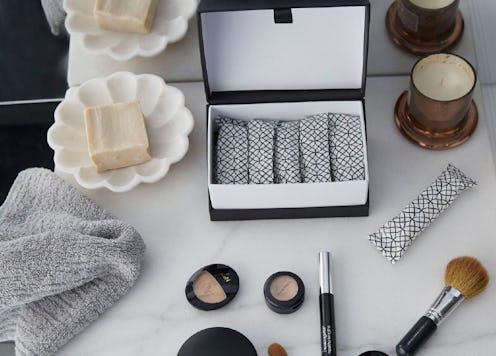
Period management is something we don't often talk about, thanks to the (totally unnecessary) taboos around menstruation in our society — but the new menstrual product company Cora is hoping to change the face of periods in the 21st century. The brand just launched on Feb. 8, but it's already making a big impact: The idea is to combine healthy, organic tampons, with modern design, an easy delivery system, and a globally-conscious practice, all in one go. It's not the first menstrual product company to harness these ideals, but the fact that it's one of a growing number of companies that are doing so is an encouraging trend.
Cora runs as on a subscription model (corresponding to your cycle, of course), enabling you to choose what tampons you'd like to receive based on quantity and absorbency and select your payment schedule (monthly, quarterly, or yearly). Everyone's first box also includes a Cora Signature Kit featuring their Little Black Box and Little Black Clutch for storage. Your order is then refilled every three months. The subscription also ships free and can be cancelled or changed at any time.
The company was started by Molly Hayward and Morgan Newman, who were each in the midst of starting separate alternative period companies when they first met; instead of moving ahead with two different companies, they decided to join forces to create something even better together. For Hayward, the inspiration came from the feminist movement and her drive for women's health. “What started as a simple belief that gender equality in education is paramount to poverty eradication has evolved into a women’s health company and a movement to support health, girls’ education, and women’s empowerment," she writes in a press release.
As part of their globally-conscious initiative, Cora will also donate a month's supply of sustainable pads to a girl in a India and other developing countries for every month's subscription you have. In fact, a trip abroad was a huge part of what inspired Hayward to create Cora in the first place: “Several years ago I was travelling with an organization in Kenya when a girl named Purity told me she and other girls would stay home from school during their periods because they couldn’t afford sanitary pads," she writes in a press release. Indeed, according to Unesco, one out of 10 girls in Africa will miss school during their periods because of inadequate access to menstrual supplies, which will eventually result in them dropping out of school all together. Worldwide, the number of girls who miss school due to lack of access to menstrual products is estimated at 100 million.
Cora has also partnering with local organizations in India to hire women to manufacture the pads they donate, who are all paid a living wage and given free health education. Why don't they donate their own products? The company notes on its website that "sending products abroad... can undermine the local economy." Their alternative model, however, contributes to it, empowering women while also providing the products so many girls and women need.
The tampons in each Cora subscription themselves are 100 percent organic, biodegradable, hypoallergenic, BPA free, and contain no fragrances or synthetics. For context, the FDA does not require testing of menstrual products; nor are menstrual products required to list their ingredients on their boxes. This doesn't necessarily mean that there's anything problematic in standard box of tampons, but the lack of transparency is troubling — especially when you consider exactly where we're all putting those products.
Along with Cora, several other new companies are also working to change the face of period management. Conscious Period is another example of a menstrual company with a mission; their one-for-one model results in a box of biodegradable pads being sent to a woman in need for every box of tampons purchased. Meanwhile, AFRIpads helps to stimulate the local economy while also empowering women's health: The company's kits are manufactured and sold in Uganda, with a staff made up of 90 percent women. Lunapads is also doing great work, creating not only some of the first reusable menstrual products, but also programs that give reusable underwear and pads to girls in need in developing countries.
The bottom line is that periods are, have been, or will be a fact of life for 50 percent of the people who live on this planet. The stigma against menstruation needs to go. The taboos do, too. And although we clearly still have a long way to go, it's encouraging that so many people are working toward the paradigm shift we need.
Images: Courtesy of Cora